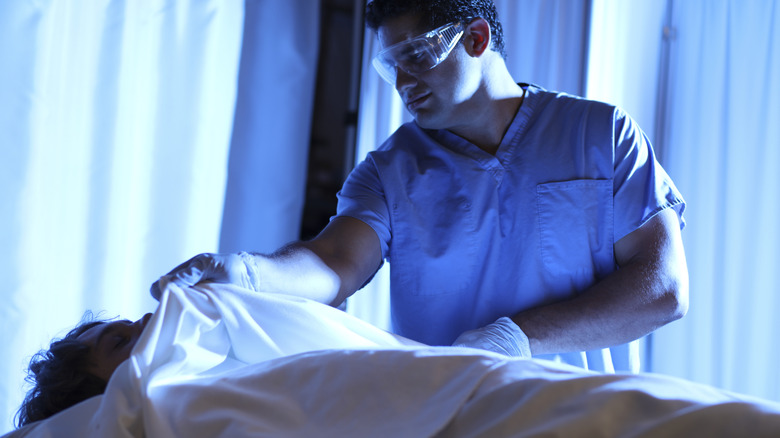The Strange Noise Your Body Makes After You Die
Ironically, the phrase "silent as the grave" may not apply to us after we die. Following death, the human body goes through a series of immediate, early, and late-stage postmortem changes, according to updated 2023 research published in StatPearls. Immediate changes involve the shutting down of vital organs, where all breathing, blood flow, and nervous system function come to a stop. Examples of early postmortem changes include muscle rigidity, a drop in body temperature, and skin becoming pale in color. Late postmortem changes involve deterioration of the body as bacteria start to break down the cells, tissues, and organs.
While changes like skin discoloration or decreases in body temperature are often expected after a person passes away, what you might not expect is for that person to emit audible noises. Granted, it's not actually the person themselves making these sounds, but rather the body. Shortly after death, a dead body may let out sounds that resemble a moan or groan, reports Bustle. Here's why this commonly happens.
The release of air from the lungs can cause a dead body to moan or groan
The body isn't empty when a person dies. Leftover food, for example, often remains in the digestive tract. The muscle relaxation that occurs as soon as death takes place may therefore cause the body to release feces or urine following death (via Bustle). Similarly, just as undigested food may be found in the stomach or bowels, unreleased air may still be in the lungs after death. As the body is moved, the expulsion of that air can produce sound. This is often the case if cardiopulmonary resuscitation (CPR) has been performed on the body.
"When a doctor or someone tries to resuscitate a person, extra air gets pumped into the patient's lungs and stomach," health and wellness expert Caleb Backe told Bustle. "After you've died, the air can still escape if someone applies pressure to the body while moving it. It could sound like moans, groans, and even squeaks."
The risk of germ exposure when air is released through the mouth
The expulsion of air that occurs when a dead body is physically moved can be of concern to funeral home staff when entering a deceased person's home. Eric Bell, funeral director and owner of David A. Hall Mortuary, told IndyStar in a 2020 interview that when this respiratory function occurs, care staff can potentially be exposed to virus particles and other germs. To help protect themselves and reduce the risk of illness, Bell explained that in the midst of the COVID-19 pandemic, staff had been instructed to use a rag soaked with topical disinfectant to create a protective absorbent barrier between themselves and any droplets released into the air by the body.
In addition to emitting a moan, wheeze, or groan sound, experts further told Bustle that the body may do a number of other unexpected things after we die. This includes the development of an erection, ejaculation, or movement of the muscles. That's not all, however: some people may open their eyes as they die, or may even pass gas after death.



